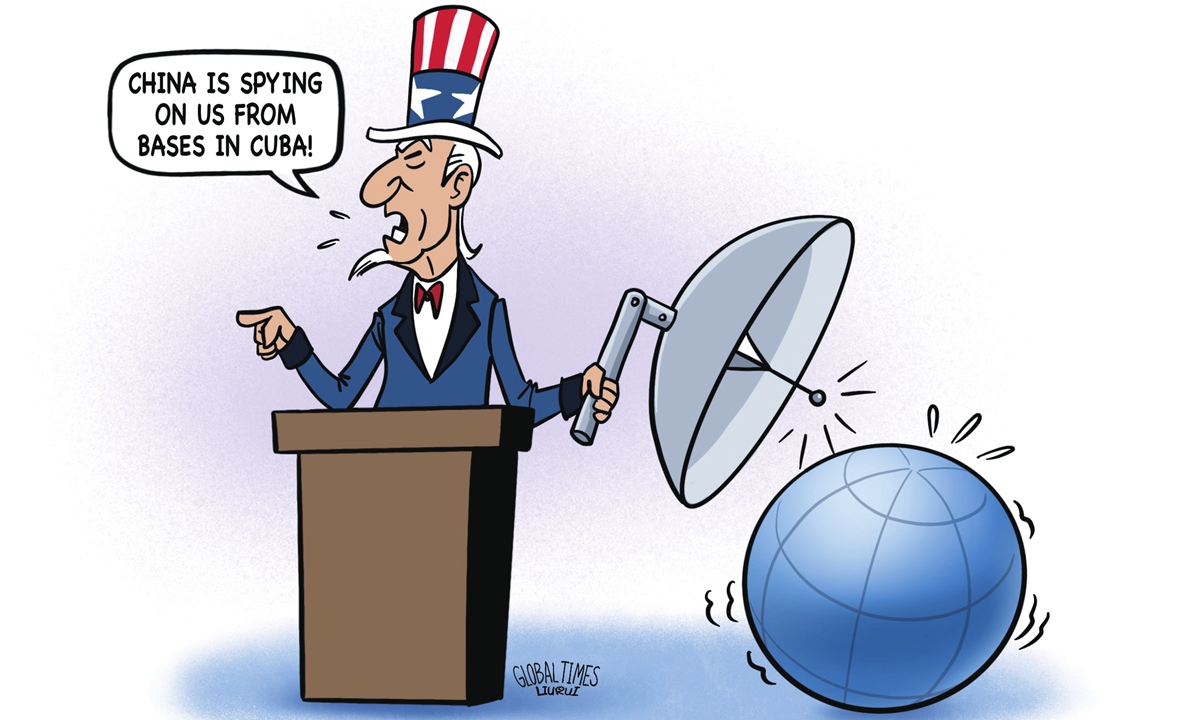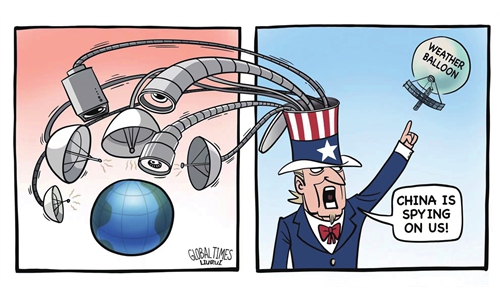A US political game: Speculations of China's 'spy base' in Cuba surface ahead of Blinken's Beijing visit

Illustration: Liu Rui/GT
It's been 10 years now since a massive leak of secret American intelligence documents exposed to the world what most of the world had probably suspected for a long time: The US is the world's first and foremost nation when it comes to spying on its enemies, with massive resources devoted to global data gathering and analysis of information on its foes.It was somewhat less expected that the data leak revealed in excruciating detail too how Washington is also the global leader in covert intelligence gathering from nations supposedly its allies. At the time, France declared the attack on this sensitive aspect of its sovereignty intolerable. Then-US president Barack Obama tried to assuage the anger of those allies with the glib message that everyone does it. Obama's assertion of "That's how intelligence services operate" was backed up by his secretary of state, John Kerry, stating that the US wasn't the only one spying on its pals.
The leaks, carried out by former National Security Agency worker Edward Snowden, exposed the NSA's global surveillance operations working with other governments and with corporations to monitor worldwide telecommunications. It also exposed spying on some of those both "friendly" governments - and some "unfriendly" ones - including Brazil, France, Mexico, China and Spain, plus dozens of world leaders like German chancellor Angela Merkel.
The US also spied on its own citizens and the people of other nations. Britain was one of those targets for eavesdropping, which is ironic as the UK - then, as now - is home to one of the world's most important communications monitoring stations, Menwith Hill, in North Yorkshire. Although it is owned by the country's Ministry of Defence, it is operated by US Air Force and NSA personnel. Its job is to spy on communications around the world.
A decade later, America is still at it. Dozens of classified Pentagon papers leaked online this year saw Washington stand accused of continuing to spy on its allies - this time, Israel, South Korea and Ukraine. The difference this time is that there has not been the same kind of media or diplomatic frenzy that accompanied the 2013 revelations. Why? Possibly because nobody is surprised anymore, and most expect it of the American military and intelligence community.
It is clear that Washington's global spying reach is phenomenal. So it seems a bit rich that suddenly there is widespread outrage in America over a report that China and Cuba are developing a multi-billion dollar spy base on the Caribbean island to eavesdrop on American communications from barely 150 kilometers away. The report first came in the Wall Street Journal, citing anonymous sources, and - despite the sources being anonymous - spread like wildfire as other media outlets repeated the allegations. Even when both Cuba and China issued flat denials, the story continued to generate headlines. If not always, then often, "anonymous sources" can be official sources deliberately placing disinformation in the media, for whatever reason.
Then the first bizarre thing happened. The Pentagon cast doubt upon the veracity of the allegations and accuracy of the report. "We are not aware of China and Cuba developing any type of spy station," Brigadier General Pat Ryder, the Pentagon's press secretary, told journalists. This, too, was duly reported. It was rapidly followed by the second bizarre thing: An unnamed Biden administration official was quoted as saying, despite the earlier denials, that the White House had been aware of a clandestine agreement between Beijing and Havana to build a spy base - and that one has been top and running since 2019. To say these were mixed messages is an understatement.
As a journalist, I was taught that when an anonymous source came to me with information to publish, my question to myself should be, "Why is this person telling me this?" And surely it is extraordinary of the US to accuse China of spying in its backyard. America has surrounded China with military bases, many capable of being used to monitor and spy on China. Most recently, Washington signed an agreement with Manila to build more military facilities (a development not universally welcomed in the Philippines). So getting hot under the collar about China's links with Cuba is a bit like a thief calling to catch a thief.
Is it any coincidence that this flood of misleading tips, nods and winks is coming shortly before America's Secretary of State Antony Blinken is reportedly due to travel to Beijing in an effort to smooth out the kinks created in the US-China relationship since the start of the dysfunctional Biden administration? After all, the last time Blinken was due to visit China, he had to cancel because of the confected outrage created by the so-called balloon incident.
If someone in Washington is playing games, perhaps even behind the scenes, it's time to behave like serious people and stop.
The author is a journalist and lecturer living in Britain. opinion@globaltimes.com.cn

